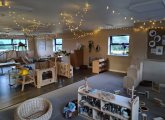The success of ‘outstanding’ Blois Meadow Day Nursery is built upon the varied talents, considerable experience and genuine passion of its owners, as TEY discovered…
Why is it that some nurseries prosper, educationally and financially, while others struggle to make the grade in one or both categories? All cases are different, of course, but the dual demands of running a business that sells ‘care’ and ‘education’ undoubtedly have the potential to trip up the unprepared. Ask Alison and Ross Midgley, the owners of Blois Meadow Day Nursery in Steeple Bumpstead, to name the secrets behind the considerable success they’ve enjoyed in the early years sector and high up on their list – alongside the healthy dose of good luck they readily admit is essential whether you’re founding a business or trying to impress the inspectors – comes the complementary skill sets they possess: “I think a lot of nurseries fail because owners see them as businesses and nothing else, or because they’re nice and fluffy but have no idea how to run a business,” says Ross, who has a background in accountancy and was one of the initial members of the early years trailblazer group tasked with reforming apprencticeships. “We’ve been able to avoid both of those two extremes.”
“It’s a difficult balance to strike because education – and I see it as education rather than care – and business are two different trades,” Alison adds. A former primary school teacher with early years experience, she now manages the Blois Meadow setting, providing the pedagogical expertise in the partnership.
Difficult it may be, but having built up three ‘outstanding’ and profitable settings during their first foray into nursery ownership in the noughties, and now presiding over another, Alison and Ross have clearly arrived at an approach that works.
What’s obvious, listening to the story of the 15 years since they entered the world of private daycare provision, is that for both, being successful is about more than ticking boxes. Their approach is pragmatic but far from mercenary, and they clearly care about the children coming through their doors and the sector as a whole. “What has really set us apart from some of the nurseries we’ve competed with,” Ross tells us later, “is that we’re doing this because we want to.”
“We’d often talked about setting up a nursery, but we’d never had any real plan to do it…”
Alison and Ross’s nursery is a 42-place setting situated on the Blois Meadow Business Centre in Steeple Bumpstead, three miles from the town of Haverhill, Essex. Its three rooms – comprising an upstairs baby room and two downstairs playrooms – and outdoor area are full of inviting learning opportunities. Colourful displays cover the walls and resources of every kind abound, accessible via low-level storage to help children choose their own activities. Staff “work from the child outwards”, nurturing their charges as individuals. As is the norm with ‘outstanding’ settings, it is a conspicuously happy and enthusiastic environment.
Look back two years, though, and things were very different. The transformation that has occurred is the latest example of the effective style of ownership that Alison and Ross have perfected.
Their story begins with their entry into the early years sector back in 2001. “We’d often talked about setting up a nursery as one of those conversations you have when you come back from holiday and think there must be more to life, but we’d never had any real plan to do it…” Ross tells us, “...until we inherited a small amount of money. It wasn’t enough to pay off our mortgage, fortunately, otherwise that’s what we would have done! We were taking our kids to school one day, the County High in Saffron Walden, and Alison said that it would be a great place to open a nursery. When I asked her ‘Why?’ she had all the answers: you’d get instant credibility because you’d be associated with a really good school; it was cheap land, a good site with good access; teachers would be queuing up to put their children in an on-site nursery…
“It all sounded very sensible, so we went to talk to the head, and to cut a very long story short, we ended up with an arrangement to rent the sixth form car park. We couldn’t afford a brand-new building, so we bought a second-hand nursery from the Elliott Group, which had been in their rental fleet and was awaiting renovation. We found some builders and architects, and we embarked on this project. It just mopped up money – we ended up with the house on the line. And then we had some empty modular buildings and no children.
“We were starting to question whether it had been a good idea or not, but then we had one of those amazing pieces of good luck.”
Having attracted applications for work from a number of staff from a troubled nursery on the site of the Wellcome Trust’s Genome Campus, five miles away in Hinxton, Cambridgeshire, Alison and Ross were contacted by the Trust and asked if they would like to submit a business plan to take it over. “We hadn’t even opened at Saffron Walden,” Ross recalls, “and I was on a business trip in Singapore at the time. I ended up faxing individual pages to them from the hotel, but I came back to find that they’d appointed us. So, we took over a full nursery, a full staff team, which was fantastic because it meant we had some cash flow to finance the other one. But we still hadn’t run a nursery at this point!”
“All three nurseries ended up with Ofsted’s top grade at their first inspections.”
Running the two settings represented a steep learning curve for Alison and Ross. Alison had intended to manage the Saffron Walden setting while Ross did the books at the weekend, but the group’s unforeseen expansion and the realities of the job forced a rethink. Instead, Alison took on a supervisory role, overseeing and supporting her staff teams, though she maintained a hands-on attitude: “I knew the children, the families and the managers; any time any of the managers were away I could be there to step in. I learnt my trade again, in that respect, because managing a nursery is a professional job,” she tells us.
Despite its owners’ lack of experience, the Crocus Early Years Group, as it was dubbed, flourished – so much so that it wasn’t long before Alison and Ross approached another school, Great Cornard Upper School – a secondary/sixth form in Sudbury, Suffolk – and were given the go ahead to open their third setting.
“Crocus ended up as quite a sizeable small business, with three nurseries, all working closely with the schools,” Ross reflects. “And they all ended up with the best Ofsted grade it was possible to get, simultaneously and at their first inspections under us, which we were delighted with. It’s not an easy thing to do – particularly when you haven’t done it before.”
Then, five years after opening their first two nurseries, Alison and Ross made what might seem the surprising decision to sell Crocus, the group joining Bright Horizons in 2007. “We got to the point where we realised if we wanted to take it any further we were going to have get bigger and that would have meant introducing another layer of management,” Ross explains. “I thought, having got this far, I didn’t want to be back putting a suit on every morning and going down to talk to our financial backers; I was happy with life how it was!”
Rejecting an early retirement, Alison and Ross instead embarked on a new project, founding e-portfolio training company PB Development to offer qualifications to those working in the early years sector. Working from an office (an office that was to become their present nursery’s under-twos area) at the Blois Meadow Business Centre, they expanded, securing City & Guilds and NCFE accreditation and a Skills Funding Agency contract, and today working with learners across England and beyond… And that might have been the end of story to date, had a struggling nursery a stone’s throw from PBD’s present home not come to their attention.
“Do things as well as you possibly can and the business will come.”
“We were quietly running PBD and became aware that a nursery had moved in over here,” Ross tells us. “We didn’t know anything about it, then heard that it was up for sale. We thought, do we want to do this again? But Ali was up for another challenge, so having had no intention of ever going back into the nursery business, we came over to have a look and just thought there’s an awful lot of potential here…”
While there was potential at Blois Meadow Day Nursery, there were also challenges. Many parents and children had left in the preceding months, and as a consequence, when Alison and Ross took over in October 2012 the setting was losing in the region of £6,000 each month. “We were in the fortunate position that having sold Crocus, we weren’t dependent on the nursery returning to profit on day one,” Ross says, “so we could afford to back our judgement and invest a bit in quality, put the staff back on full-time work, hire new staff even though they weren’t justified by the number of children. We’ve always believed that the key with any venture is to do things as well as you possibly can and the business will come, rather than release quality in small doses as you can afford it, which is not the way to do things.”
In the short space of time between their takeover and Ofsted’s arrival in May 2013, much was accomplished. Structural changes saw the relocation of manager’s office and kitchen – the latter to a nearby Portakabin, the former to where the kitchen had been – the creation of a shared main entrance, and a reorganisation of the baby room to create discrete changing, feeding and sleeping areas. “We went to the landlords and told them what we wanted and they agreed to do it over three or four weekends, so we never had to close the nursery at all,” Ross says.
There was also, Alison tells us, a need to restore the confidence of a staff team whose morale had dropped as the business had struggled. “The staff were pretty good when we took over. They were experienced and well trained, but as the nursery had shrunk, they had become terribly enclosed and stuck to a rigid routine. That has the knock-on effect of making you look into the box rather than out of it,” she explains. “I try to encourage staff to run with their ideas – to make decisions and have a go, and if it doesn’t work out, put it down to experience. I listen to them and I try not to say ‘no’ – we might not be able to afford every idea straight away but we keep them as plans for the future.”
These changes, and others – from the authoring of a comprehensive SEF to the introduction of an under-twos area outdoors – helped earn Alison and Ross their fourth ‘outstanding at the first attempt’, and, more recently, saw Blois Meadow short-listed for a ‘Nursery of the Year’ Award.
“Attention to detail has been vital, and listening to parents, on one hand, and staff on the other – it’s a people business and we’re quite good with people,” Alison says, reflecting on their latest achievement and those that have underpinned it. “I’m really proud of where we are now.”
1. Sustainable settings
“It’s always struck me as blindingly obvious that if you’re running a nursery with people’s most precious possession, the last thing they want you to do is cut corners in pursuit of lower fees,” Ross says. “We’ve never been particularly expensive but we’ve always said if we can’t do this by delivering high-quality, we’ll go and do something else.”
2. Time for a change
“Both Helen [Fowler, deputy manager] and I are firm believers that if a room isn’t working, it’s time to move the furniture,” Alison says. “Often the staff come in after the weekend to find everything different! Rooms are never set, because different groups of children have different needs; the more you can adjust to those and vary what’s going on, the better provision you’re offering the children. I think that’s very important.”
3. Driving improvement
Having spent 30 years teaching in a number of schools – from London’s East End to Steeple Bumpstead itself, where she helped set up the early years class – and holding an assessor’s qualification thanks to her work with PBD, Alison has no shortage of educational experience. Today, as well as managing her setting, she is supporting one of Essex County Council’s learning communities, helping to drive up standards in local settings as well as her own.
4. Manager’s role
“My role is primarily educational,” Alison says. “I cover sometimes and spend time with parents in the mornings. I try to walk through, to look at displays, look at planning. Of course you can’t escape the administration – especially the little things; how many calls do you get each week about printer toner, or nappy bags? You’ll be in the middle of something and that will throw you!”
Teach Early Years visited Blois Meadow Day Nursery in 2014.

Is your early years setting sustainable?
Editors picks

How to create an eco-friendly early learning environment
Editors picks

Hygge in the early years – What it is and how to do it
Editors picks
